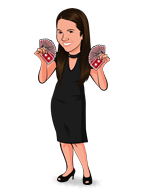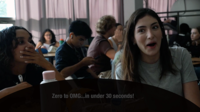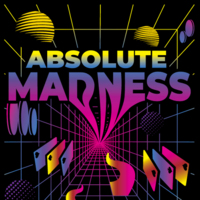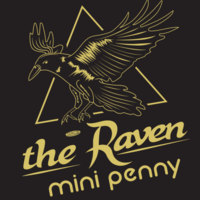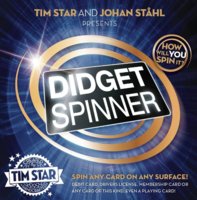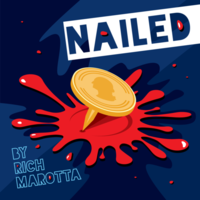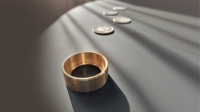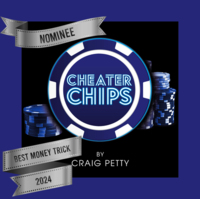Automatic Magic Square presented by Tori Noquez (Instant Download)
This is your chance to learn the best number trick in the world. Read minds AND impress THE HECK out of people! START LEARNING INSTANTLY.
The best number trick of all time.
This effect combines a little bit of mind reading and lot of impressive math wizardry. The Automatic Magic Square makes you look like a genius. Thankfully, the method only requires very basic elementary math skills.
They think of a number and immediately you start writing numbers down. It looks like their thoughts are guiding your pen to write numbers down. After you write many of the numbers down you ask for their number and in seconds you complete the magic square. You mention that while you did not write down their thought of number, something interesting has happened. You noticed that all of the numbers in each row equals their thought of number. Same goes for each column and the diagonal lines too. Not only that but you can even add the four corners and they add up to the thought of number. Whether it is mind reading, magic or math, the Automatic Magic Square is an impressive feat no matter how you add it up.
ASK HERE
Featured Magic Tricks
4 star 24%
3 star 13%
2 star 5%
1 star 2%

 Simpler Than I Expected - That's a Good Thing
Report this review
Simpler Than I Expected - That's a Good Thing
Report this review
I was always curious about the magic square, but I never got around to learning it. Now that I have, I'm glad I did. It is a much simpler trick to perform than I expected. Simple is good. It means I'm more likely to perform it. This trick is fail proof as long as you can memorize a few numbers (or you do a little prep like Tori shows... but to me the memorization seems to be the more organic method). If you're interested in the magic square, this version by Tori Noquez is a no-brainer. Get it. She goes through and teaches how it works. I know that some reviewers have said they were really needing to hear the explanation... but I for one appreciated it. I was still a little confused at the end (it's ok... my fault. I'm dumb when it comes to math) and I do wish that she went into more specifics about HOW she came up with all the numbers used (is it a pattern? What?), so that I could make up my own magic square or even do a totally original one on the fly. But still, good stuff. Maybe it's not that easy to come up with my own version... maybe this requires the work of a skilled mathmatician to make up a new one, so I won't ding her on that. Good job teaching this, Tori.
My proble with this trick actually has nothing to do with Tori's teaching, but with the trick itself. To me, this is a math trick, not a magic trick. It doesn't fit exactly in my own idea of what magic is. That's just my own personal opinion. Of course, I will not lower my review score because of this... that wouldn't be fair. But just my two cents: this is an incredible trick. Just not "magical". Yes, this can certainly be put into an act. But I think it more showcases one's intelligence than his or her magical abilities or sleight of hand. Does that make sense? Of course, again, it still can be used. I can easily see Derren Brown use this... his act approaches magic from a different angle than, say, Dynamo. This trick is great for mentalists who are demonstrating their intellectual mastery over the human brain. But someone like David Copperfield who does more of an illusionist, it would be a cool trick but not really feel as fitting in his act.
Ok I'm rambling. Sorry.
Let's wrap this up:
- Price? It's worth it. Now that it's on sale, the pricing is perfect. At full price, it's a little on the high side, but still a satisfactory purchase.
- Easy to learn? Yes, it's very easy to learn.
- Will I perform this? Yes, definitely. It'll make me look like a genius. (Remember, magic is all about illusion! Haha!)
- How magical is this trick? My personal opinion: this trick is not magical but impressive. This can be used to impress on someone that you're very smart and, if you're a mentalist that approaches your craft from a "realistic" approach (claiming to use body language, NLP, psychology, etc a la Derrik Brown, this trick will fit right into your repertoire to convince people of your intellectual prowess)
I give this trick 3.5 stars. I reserve five for mind-blowing "magical" tricks... which means that most of the tricks I review are going to be on a scale of 1 to 4 stars. Good job, Tori!
(By the way, I always try to be honest and straightforward in my reviews, while being respectful to the magician. If you appreciate my reviews, can you please click the "Yes" button below beside the question, "Did this review help you?" It's not like I actually benefit in any way by your clicking it... but it would be nice to see if my reviews are helpful or not. I hope they are. If you ever have suggestions or comments or questions about my reviews, please feel free to leave me a constructive comment. I'm just trying to be helpful. I love the Penguin community and hope that I can someday contribute my own product. :-) Thanks for reading and for any (hopefully positive, but either way, at least kind) feedback!)

 You will go do this!
Report this review
You will go do this!
Report this review
The teaching here is complete and functional. It is a bit dry and it goes into the mathematical mechanics of how this works. It isn’t actually necessary, and it will certainly lose some people, but it will also inspire some highly analytical people to give this a try. Once you do a magic square, you will love it!
The only hesitation I have on this is... there is nothing new here. But that’s OK, the magic square in its basic form is as old as dirt... but way more fun!

 Automatic Magic Square presented by Tori Noquez
Report this review
Automatic Magic Square presented by Tori Noquez
Report this review

 A great trick and a great teacher
Report this review
A great trick and a great teacher
Report this review
I don't know if Ms. Noquez is a professor, but I would bet that she is, or at least has teaching experience. It shows in a number of ways. First, she is very comfortable using the chalk board and that makes this explanation much more lucid. Second, she knows how to explain difficult concepts. Anyone who watches this will have no trouble understanding and doing the square. Third, she goes into not just how to do the square, but also why it works. You may not care about this, but it will help in your understanding.
Overall this is a bargain at the price. Clear instruction for a great trick does not come along that often. This is one of those pieces and you can perform it whenever you choose. Trust me when I say that doing this for a math geek will kill and you give them a souvenir to take home and remember. Highly recommended.

 youtube quality
Report this review
youtube quality
Report this review
She seems like a pleasant person though and I'm sure she did her best.
If you already have any experience at all with the magic square you won't find anything new here.

 It's a magic square, well explained but...
Report this review
It's a magic square, well explained but...
Report this review
Perform mentalism? If you don't have a magic square in your repertoire you really should. Really. They build reactions so well and seem impossible to your audience. Learn one.
The one you learn could be this one. It's simple to learn, easy to do and will work. The audience will like it. It's clearly and well explained and has a great explanation of how/why it works.
BUT - there are others that will seem even more amazing!
Want to EASILY demonstrate REAL mathematical genius by revealing a thought of cube-root with your magic square in under 30 seconds? With an excellent premise for the whole thing? Then get RootSavant from Phill Smith. Oh, it's got a brilliant crib too which makes that REAL mathematical genius thing a whole lot easier!
Got a decent peek? Have a look at Mark Elsdon's version.
Want a well hidden crib? Matt Johnson's your man.
As I say, pretty much everyone who performs mentalism should have a magic square up their sleeve and if you don't, this is a good place to start.

 How to make the Magic Square really "Magic"
Report this review
How to make the Magic Square really "Magic"
Report this review
The well known modification included here, making it "automatic", means that the square can mostly be completed in advance, avoiding the boredom of watching while the magician does the mental arithmetic for the whole thing.
There are a number of ways to make it magic, and the best one I know is the "NFA Magic Square" by Mark Elsdon, where the magician arranges to get a peek of the spectator's number rather than lamely asking for it.

 Good Magic Square Effect
Report this review
Good Magic Square Effect
Report this review
If you've never performed the magic square, this is a well taught, good place to start. If you already perform the magic square, this is probably a method you already know.
I gave it a 4 star rating assuming that you have never learned the magic square and would like to start with an easy method that you can learn and start performing quickly.
Instructions are clear and straight forward. Well taught.

 Easy , easy , easy
Report this review
Easy , easy , easy
Report this review
If there is one number square to be learned it must be this.
Oh and did I say it is easy easy easy

 Better than my old method (by bunches)
Report this review
Better than my old method (by bunches)
Report this review

Act Builder beta
